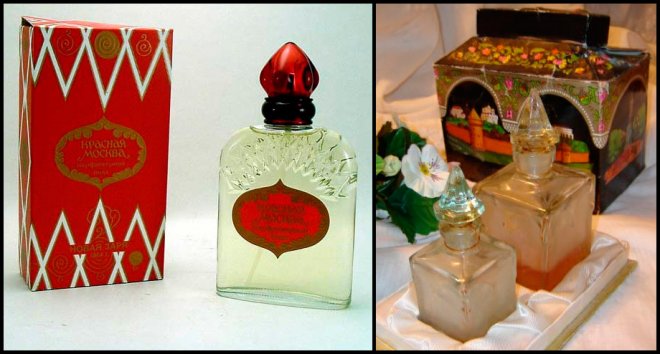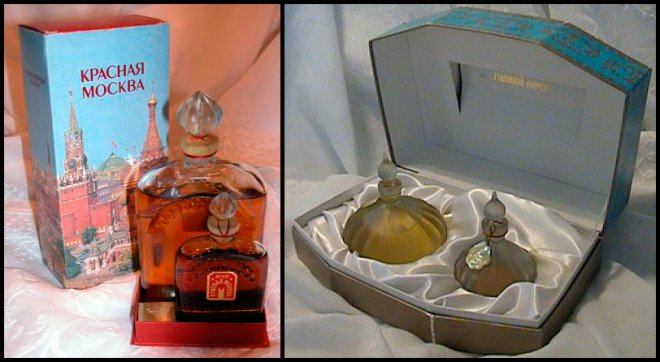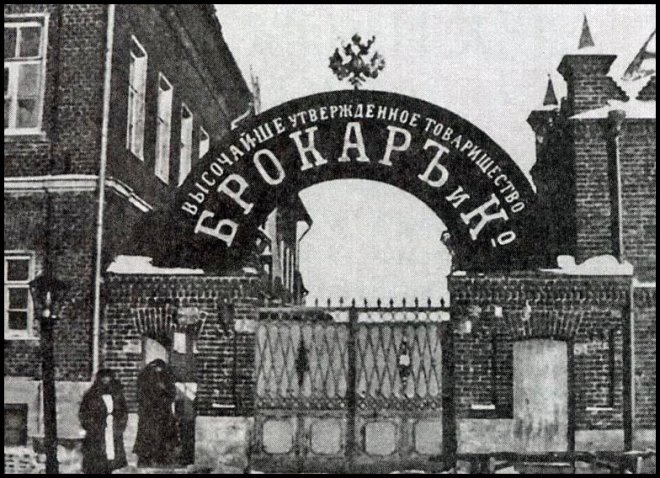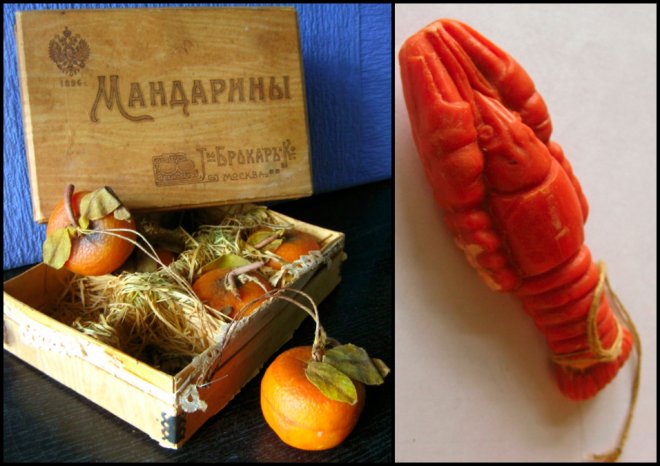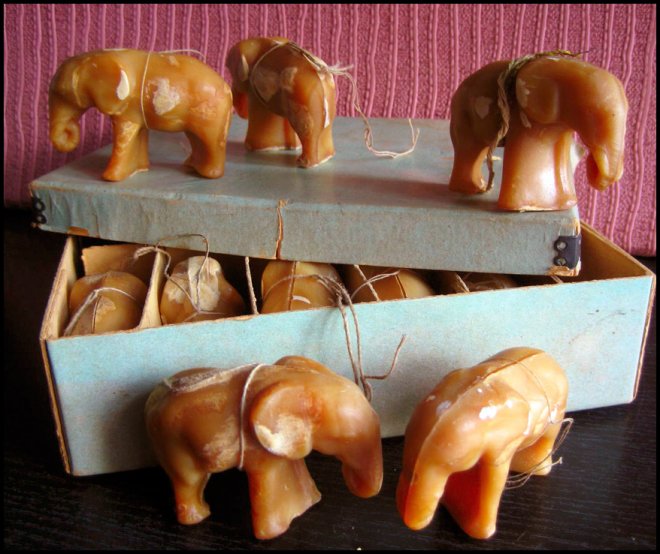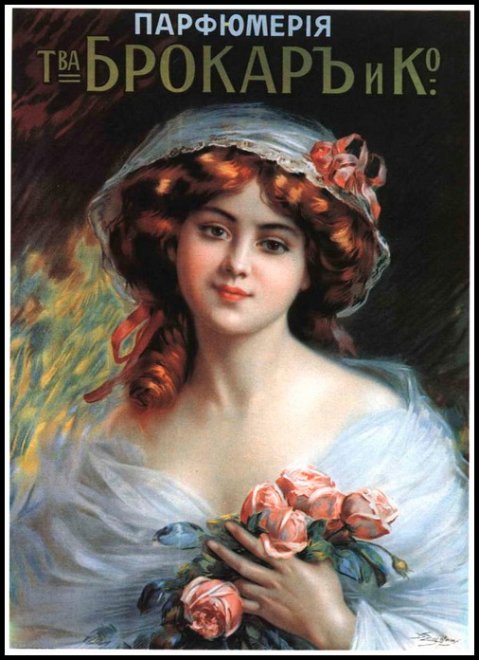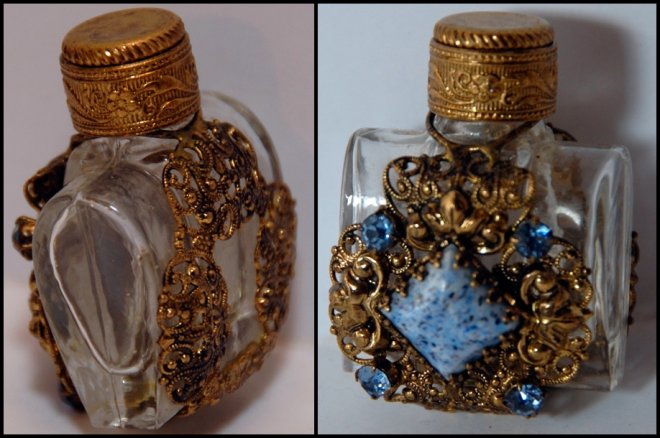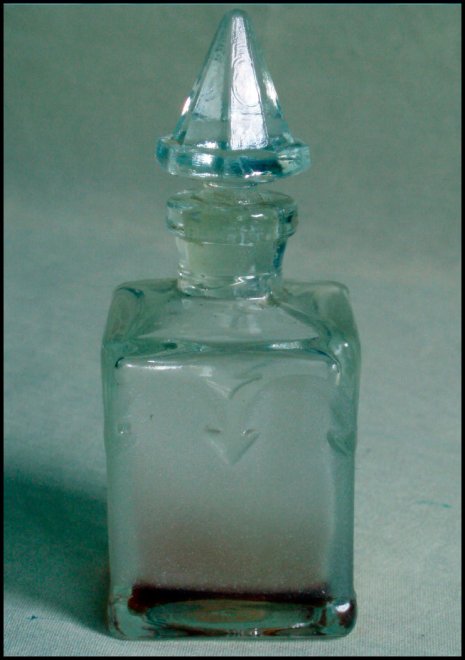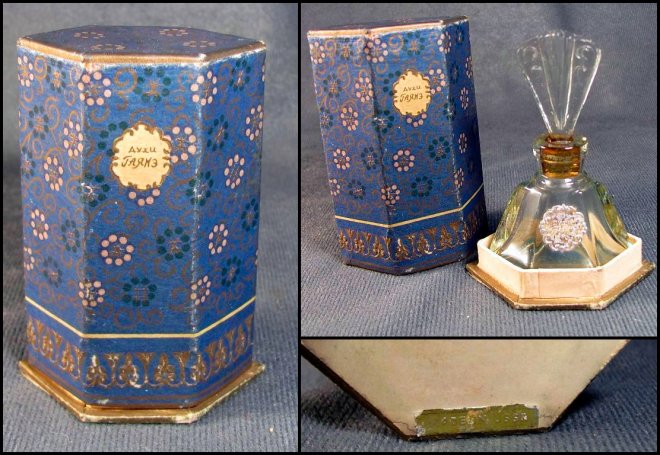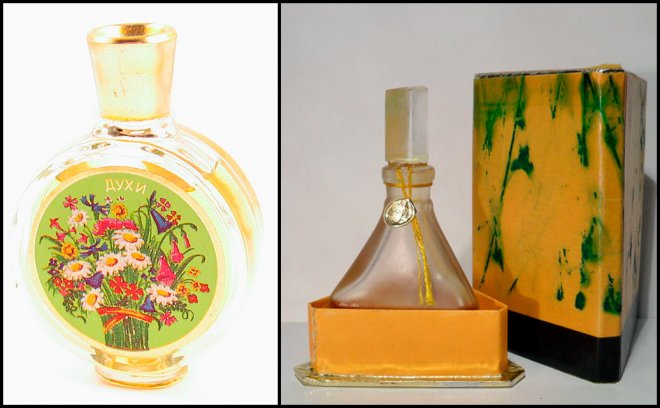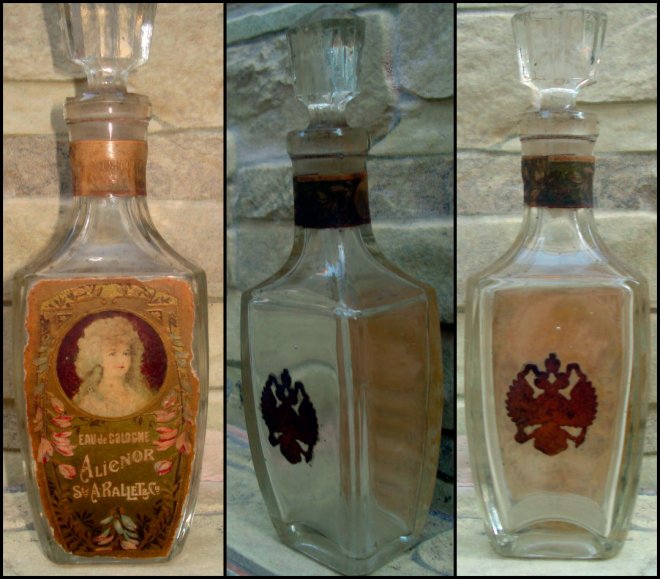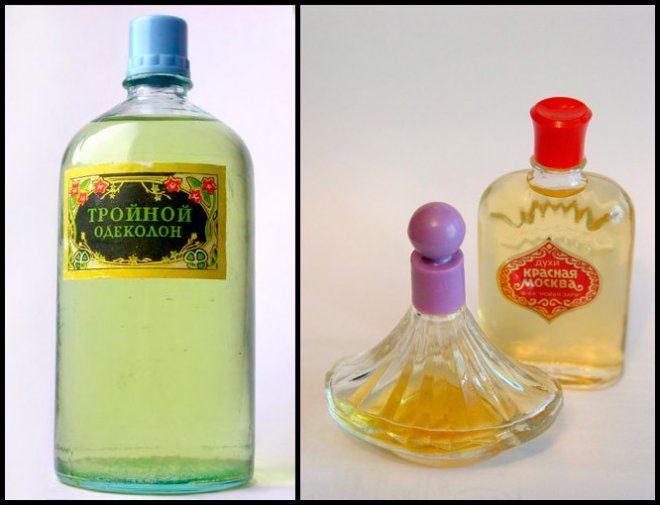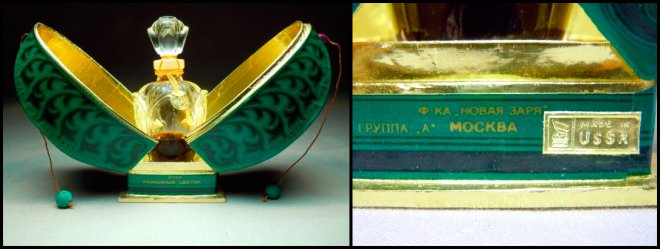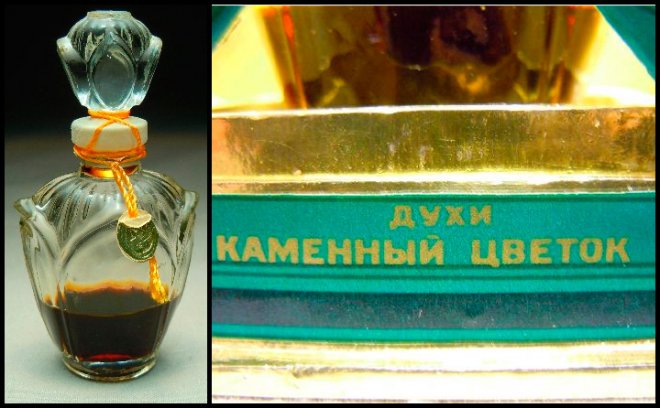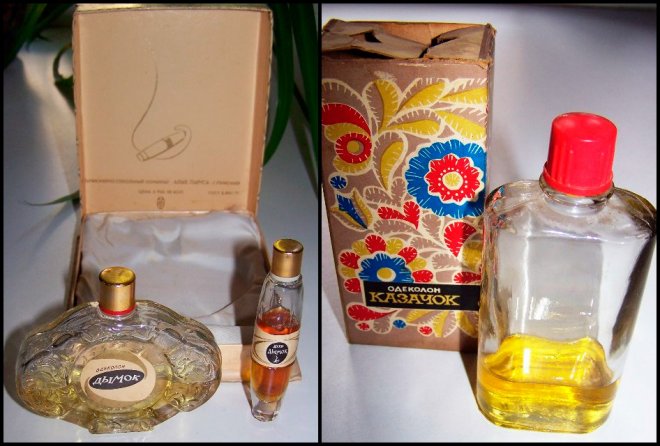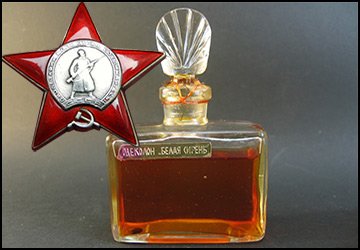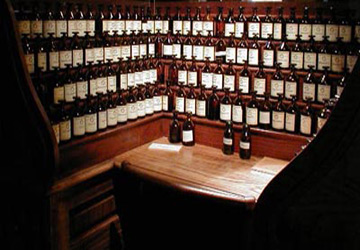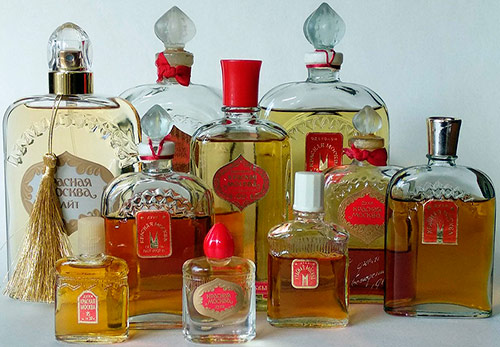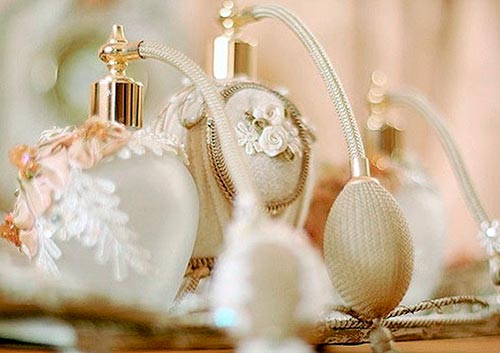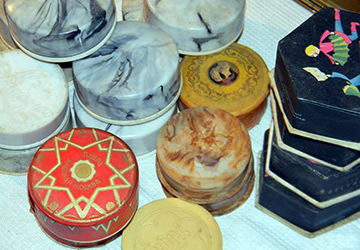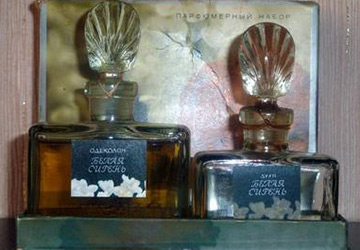Perfumery
Perfumes in Tsarist Russia, the USSR and the perfume "Red Moscow"
Perfume "Krasnaya Moskva" - the legendary perfume, the perfume of the Soviet era, the most popular perfume of the 30s - 50s. The perfume composition contains cloves, iris, jasmine, heliotrope, lily of the valley - only 60 components. Perfume "Krasnaya Moskva" has a warm spicy aroma with a touch of violet and orange blossom. The fragrance of this perfume is preferred by strong, sensual and self-confident women. The beloved spirits of our grandmothers and great-grandmothers, they do not leave you indifferent even today. Some admire them, breathing in the scent of their childhood, while others treat them with irony, as of a time long gone.
Perfume "Krasnaya Moskva" at the beginning of the last century was so popular that a beautiful legend was born around them. Although what has become a legend had every reason for this.
In 1873, Heinrich Brocard presented a bouquet of wax flowers to Grand Duchess Maria Alexandrovna, daughter of Alexander II, who visited Moscow, in which all flowers had their own natural scent, i.e. the rose smelled of rose, daffodils smelled of daffodils, violets smelled of violets, and lilies of the valley smelled of lilies of the valley. The delight was indescribable, how such a miracle appeared! And Brocard was awarded the title of Supplier to the Grand Duchess Maria Alexandrovna.
In 1882, the perfume "Bouquet of the Empress" was one of the best creations of Heinrich Brocard - so Brocard decided to recreate bouquet aromapresented to the princess.
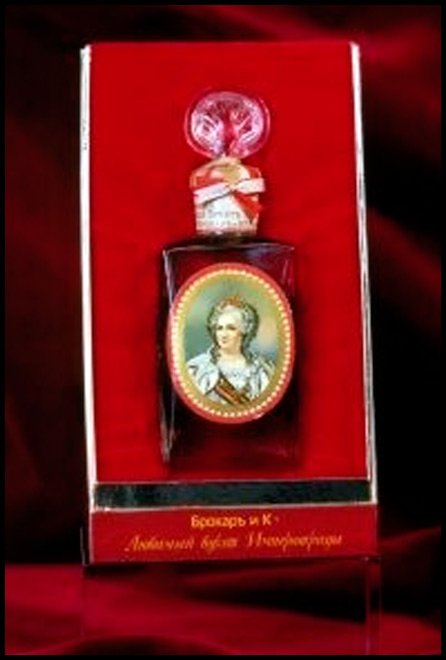
And in 1913, to celebrate the 300th anniversary of the House of Romanov, Henri Brocard presented Princess Maria Feodorovna, mother of Emperor Nicholas II, a perfume with a fragrant scent of flowers as a gift. The princess liked the fragrance so much that it was named “The Empress's Favorite Bouquet”, and “Brokar and Co” was made Supplier of the Court of His Imperial Majesty.
These two names for different fragrances are often confused. Both the one and the other fragrances were created for the Grand Duchesses, only the first was created by Henrikh Afanasyevich himself, and in 1913 by his descendant.
The story of the last spirits turned out to be continued.
When in the 20s of the last century they decided to please the Soviet beauties with perfumes unsurpassed in the beauty of their aroma, then ...
... what happened then?
Then "Brocard and Co" turned into a perfumery factory "New Zarya", where the same perfumerswho worked with Brocard, in 1922 recreated the perfume, but not with the name "The Empress's Favorite Bouquet", but with the name "Red Moscow". Most likely, the new creation differed in its composition from the "Favorite Bouquet of the Empress", or maybe they were created according to the recipe of the "Bouquet of the Empress", but truly it was a masterpiece of perfumery art.
It cannot be argued that everything in all these stories is absolute truth, because popular rumor can add or embellish something, ...
But the founder of the company itself should be told.
Heinrich Brocard, owner of one of the most famous companies in the world - "Brocard Empire".
Heinrich Brocard's father, French soap-maker Atanas Brocard, traded in lipstick and toilet soap. There were many competitors in this business, and many entrepreneurs tried to find their happiness in other countries. So old man Brocard advised his son to go to distant snowy Russia. Heinrich was only 20 years old, but thanks to his father's upbringing, he was hardworking and persistent, and most importantly devoted to his profession of a perfumer. From an early age, Henry's father forced him to memorize smells - the aromas of perfume (he will remember this more than once with gratitude).
And so, Heinrich Brocard in Russia. Having studied chemistry well and knowing his father's upbringing, he got a job as a laboratory assistant in a representative office of one of the French perfume companies. He soon invented one of the best ways to make perfume concentrate.Heinrich could have taken advantage of his discovery, but unfortunately for this it was necessary to have at least a modest capital. Then he decided to sell his idea, and with the money he received, he would organize his own business, which would start with making soap. True, he had to sell his discovery not only for his own business, but also for personal purposes. When Heinrich arrived in Russia, he did not know the Russian language, and therefore often dropped by the shop, which was kept by the Belgian Thomas Rave. With him he could speak in his native language, remember his beloved France. And with Thomas, he met his lovely daughter, who soon became his wife, a faithful companion in life and an assistant in business. Charlotte was born in Russia and has always considered herself Russian. She loved Russian poetry, adored Pushkin. But she not only read poetry, but was also a smart girl, and more than once suggested ideas to Henry, especially since she knew firsthand the modest life of the Russian province. Brocard began to make soap, but business was not very successful, there were competitors in Russia - A. Rallet, J. Duftois. And here, after thinking with Charlotte, they decided to try to make soap for children in the form of bunnies, bears and various animals, and for the people "Narodnoye" - in the form of a carrot or a cucumber. Baby soap delighted the kids, and the “Narodnoye” soap amused the adults. Probably not one of the peasants who brought soap to my village, for the sake of interest I tried it on the tooth. After a while, things went so well that they had to leave their seedy "mansion" in which they huddled with the growing family and move to another place. His "penny" soap brought him considerable wealth, and his business kept expanding and expanding. Soon it was already a factory, in which 30 people were employed instead of two workers.
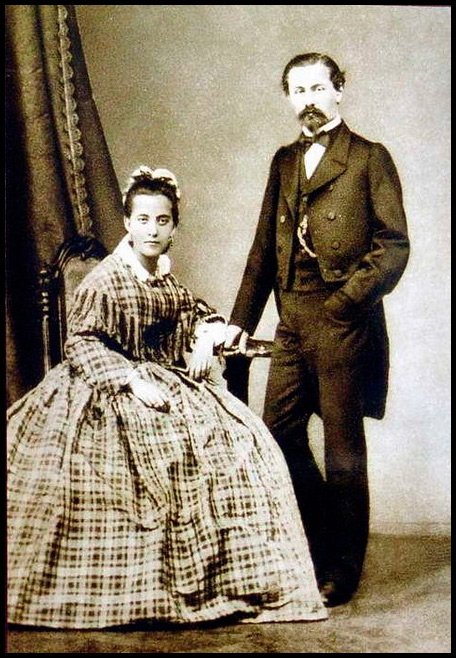
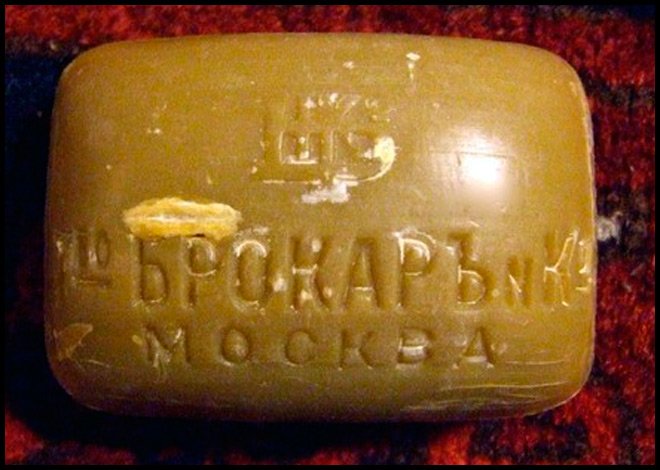
Genrikh Afanasyevich, as he was christened in Russia, got up before anyone else. From six in the morning he worked in his laboratory. As the workers of the factory, who were much outlived by Brocard, recall, by nature he was a dry man, but very fair to all workers. There was a lot of alcohol in the factory, but no one dared to touch it. And if someone was noticed with a hangover, he immediately found himself outside the factory gates. I was even more strict with myself in this regard. More than once visiting merchants who bought his goods for the fair invited him to "celebrate" a successful deal. But ... Genrikh Afanasevich was firm. Demanding to oneself, perseverance, natural ingenuity, as they would say now, in business - all this has borne fruit. And in 1869 Brocard moved his factory to the Serpukhov outpost, where it occupied an entire block.
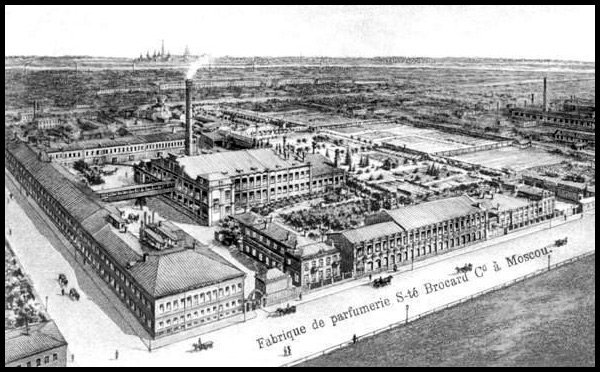
Brocard often went on trips abroad, leaving all his affairs to his wife, and Charlotte skillfully managed the sale of products. Always surrounded by business travelers, artists, she came up with more and more new ideas. For example, to reduce the number of counterfeits in the perfume market, Brocars began to use wrappers and stickers for their products. Knowing Russian tastes and demands of the Russian market, Charlotte has repeatedly offered interesting commercial ideas. Genrikh Afanasyevich traveled all over Europe, "sniffing out" and memorizing every scent fashionable at that time. As a musician remembers the sounds of music, so he memorized the sounds of aromas.
Comparing soap in European countries and in Russia, Brocard saw how much better our Russian, delicate, transparent, fragrant. Soon they opened their own shop, where goods were for every taste and for all classes.
Brocard raised his children in the same way as his father once raised him. He was demanding and strict towards them. Since childhood, the sons were next to their father near the soap-making kettles, and more than once received cuffs from him for not being able to distinguish one aroma from another or confusing the smell of Brazilian wood with marjoram. Then he indignantly said to them: “Perfumery is creativity, and perfumer inspiration can create a magical symphony of scents.As in music, there are separate tonalities, so the perfumer selects the necessary ranges of smells. "
Then a second store was opened, where enterprising Brocars began to sell sets in which there were several items with the same fragrances: (cologne, perfume, powder, lipstick, cream, sachet, etc.). It was glory. But as a real perfumer, Brocard had little fame for producing high-quality and inexpensive products. He continued to work on creating a new fragrance.
"Floral cologne" appeared at the All-Russian Industrial Exhibition in Moscow, for which Brocard received a gold medal, and Brocard himself decided to celebrate this event by launching a fountain made of "Floral cologne". Russian perfumes received medals and prizes at exhibitions in Boston, Antwerp and even at the International Exhibition in Paris, in the citadel of world perfumery. But Brocard continued to work and work. He set a goal to create a Russian perfume that would compete with the best in the world. Once he presented his wife a gift, of course a perfume called "Persian lilac", which won gold medals at exhibitions, were recognized as one of the best in the world of perfumery. But he felt it was his last chord in a symphony called Perfumery. In 1900 he was gone.
In Russia, few people remember his name, like the names of many other perfumers. They remember only the best perfumes that conquered the world. And it becomes somehow sad that the names of the main creators-composers of fragrant symphonies are fading into oblivion. Old music sounds, the fashion for vintage clothes, shoes and hairstyles returns, and old aromatic symphonies remain in the past ...
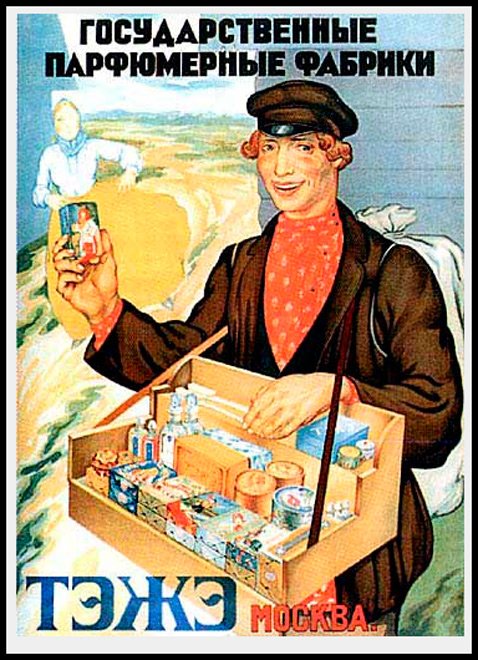
Russian and Soviet perfumery - perfume Red Moscow,
stone flower perfume and many other fragrances from the past.
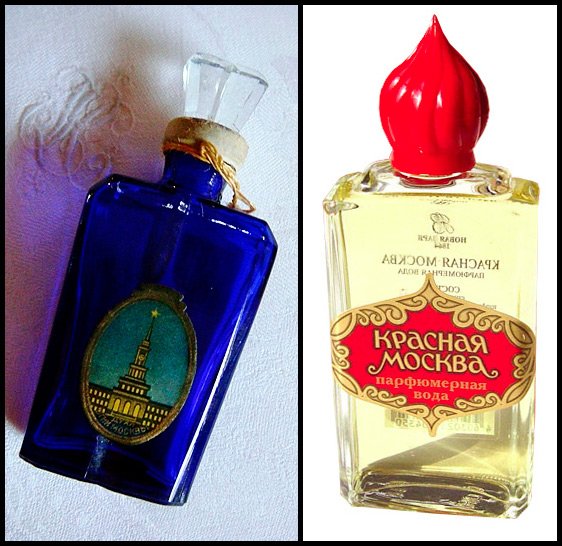
Comments and Reviews
Add a comment
Rating news
Shades of clothing that make women look younger
What shades of hair make women younger: rules and photos
Funny wedding dresses - photos and ideas
12 most expensive down jackets for the winter
How to look 25 at 40: tips from supermodels
Beautiful schoolgirls
Anti-aging haircuts and hairstyles for women
Fashionable skirts for autumn and winter
Fashionable women's trousers for the cold season
Fashionable and stylish sandals for summer 2024
Spring-summer 2024
 Fashionable dresses and tops with thin spaghetti straps
Fashionable dresses and tops with thin spaghetti straps
 Bandana tops: how to wear stylishly and beautifully
Bandana tops: how to wear stylishly and beautifully
 How to put together the perfect men's wardrobe for the summer
How to put together the perfect men's wardrobe for the summer
 Trendy shorts for spring-summer 2024
Trendy shorts for spring-summer 2024
 Fashionable skirts for spring-summer 2024: a guide to online shopping
Fashionable skirts for spring-summer 2024: a guide to online shopping
 The most fashionable dresses spring-summer 2024: styles and colors
The most fashionable dresses spring-summer 2024: styles and colors
 Fashionable total look 2024: image ideas and trends
Fashionable total look 2024: image ideas and trends
